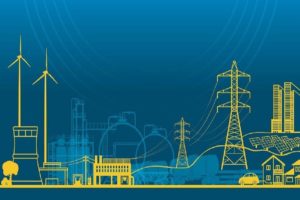A Partnership of UConn and Eversource
Eversource Energy Center
Workshop: Grid Modernization & Distributed Energy Resources
Location: University of Connecticut, Alumni House, Great Hall, 2384 Alumni Drive, Storrs, CT 06269
Date: June 14-15, 2018
Eversource Workshop Official Announcement
The Eversource Energy Center at the University of Connecticut (UConn) is hosting a workshop aimed at identifying key challenges and potential solutions related to the modernization of electric grid. The focus will be on enhancing stability and resiliency of the grid in an environment of increasing penetration of intermittent renewables and other Distributed Energy Resources (DERs) as well as other potentially disruptive factors such as climate, extreme weather events and the widespread adoption of electric vehicles.

Image Source: https://ilbusinessdaily.com/stories/511284886-illinois-lauded-on-national-level-for-grid-modernization
The workshop will explore possible solutions by considering the complex interdependencies of technology, economics, regulation and energy demand. Also considered will be the relationship between natural gas and the electric grid. Included will be a discussion of Virtual Power Plants (VPPs), where the utility controls and synchronizes multiple DER technologies such as renewable power generation sources (PV, hydropower and wind), micro Combined Heat and Electricity (mCHE) devices, pump-hydro, and battery storage. The workshop will also consider the dynamics of energy demand and supply, and discuss implications of the above technological solutions under alternate futures and extreme weather and security based outage events.
The workshop outcome will be a report summarizing research gaps and development needs, and ultimately a roadmap for their implementation.
Topics:
Workshop Session I – Identifying the challenges
In this session we will identify and explore the challenges electric utilities have maintaining stability and enhancing resiliency in response to intermittent renewables, peak loads and ramp-up effects, and other stresses on the grid caused by load profiles, electric vehicles, climate, and other factors.
We will also discuss how these conditions are expected to change over time, and the potential impact of these changes on the grid.
Workshop Session II – Identifying the technologies
In this session we will begin by identifying the current state of technology for addressing these challenges, and then explore the leading technologies that can address these challenges going forward.
The focus of the discussion will be to understand the costs and risks associated with the widespread deployment of these technologies, including social acceptance and the capacity to include Low- and Medium-Income consumers in the adaptation of DER solutions. Included in the discussion will be an overview of different DER-based solutions, including mCHE, pump-hydro, and batteries, and what role a dispatchable network of such technologies could play in addressing the challenges. A few case studies will be presented.
Workshop Session III – Potential solutions and gaps
Session III will focus on identifying potential solutions, and where there are gaps in research or methodologies for understanding and evaluating them. With the inherent complexity and interdependency of the various technologies, economics, and regulations that make up the electric grid, as well as the relationship between the electric grid and natural gas, robust methodologies are essential for finding optimized solutions.
This session will include a discussion of a virtual power plant (VPP) approach, where the utility controls and synchronizes multiple distributed energy resource (DER) technologies, as well as the Distributed Generation (DG) models currently being used in Europe and how similar models might apply here.
By identifying the gaps in research and methodologies for utilities to evaluate potential solutions, we will be able to ultimately develop a roadmap for their implementation.
Target Attendees:
• Electric and Natural Gas Utility managers and planners.
• Professionals in the energy industry, including Energy Project Developers and VPP software providers.
• Utility Regulators.
• Academics interested in the technological, economic, regulatory, and social challenges of energy and energy distribution.
Agenda:
Day 1 (Thursday, June 14th)
11:30 – 12:00 Registration
12:00 – 12:15 Opening Session – Keynote Speaker [Jennifer Schilling, Grid Modernization Director, Eversource Energy]
12:15 – 1:15 Luncheon and Keynote Speaker [Katie Dykes, Chair, CT PURA]
1:15 – 2:30 Workshop Session I – Identifying the challenges
2:30 – 2:45 Break
2:45 – 3:15 Summary I – Challenges
3:15 – 3:35 Keynote speaker [Walter Rojowsky, Manager, Distributed Grid Advisory Team, ICF International]
3:35 – 3:55 Keynote speaker [Dan Bradley, Managing Director, Navigant]
3:55 – 5:15 Workshop Session II – Identifying the technologies
5:15 – 5:30 Break
5:30 – 6:00 Summary II – Technologies
6:00 – 7:00 Social
7:00 – 9:00 Dinner / Keynote Speaker [David Owens, Retired Executive Vice President, Edison Electric Institute]
Day 2 (Friday, June 15th)
8:00 – 8:20 Breakfast/ Opening Session – Keynote Speaker [Watson Collins, Technical Executive, EPRI]
8:20 – 8:40 Keynote speaker [Ray Samuels, Senior Vice President, DBS Power & Energy]
8:40 – 9:00 Keynote speaker [Jeff Nehr – Vice President, Production & Business Development, Peoples Gas]
9:00 – 10:30 Workshop Session III – Potential solutions and gaps
10:30 – 10:45 Break
10:45 – 11:15 Summary III – Potential solutions and gaps
11:15 – 11:30 Closing remarks & Next Steps
11:30 – 14:00 Steering team meeting & Lunch
Workshop format:
Workshops will be comprised of roundtable discussion groups of 8-10 attendees and a coordinator who will introduce the topic and facilitate the discussion. After each session, the coordinators from each group will summarize the key points and present them to everyone.
Contact:
Prof. Emmanouil Anagnostou | manos@uconn.edu | 860-486-6806
Eversource Energy Center, University of Connecticut
Published: May 8, 2018
Categories: Recent News
Available Archives